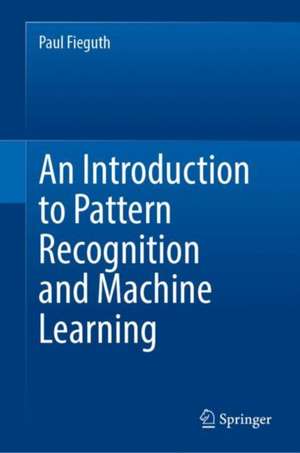An Introduction to Pattern Recognition and Machine Learning
Autor Paul Fieguthen Limba Engleză Hardback – 10 noi 2022
Preț: 600.13 lei
Preț vechi: 706.03 lei
-15% Nou
Puncte Express: 900
Preț estimativ în valută:
114.84€ • 122.80$ • 95.75£
114.84€ • 122.80$ • 95.75£
Carte tipărită la comandă
Livrare economică 17 aprilie-01 mai
Preluare comenzi: 021 569.72.76
Specificații
ISBN-13: 9783030959937
ISBN-10: 3030959937
Pagini: 471
Ilustrații: XXII, 471 p. 270 illus., 265 illus. in color.
Dimensiuni: 155 x 235 x 37 mm
Greutate: 0.87 kg
Ediția:1st ed. 2022
Editura: Springer International Publishing
Colecția Springer
Locul publicării:Cham, Switzerland
ISBN-10: 3030959937
Pagini: 471
Ilustrații: XXII, 471 p. 270 illus., 265 illus. in color.
Dimensiuni: 155 x 235 x 37 mm
Greutate: 0.87 kg
Ediția:1st ed. 2022
Editura: Springer International Publishing
Colecția Springer
Locul publicării:Cham, Switzerland
Cuprins
Chapter 1. Overview.- Chapter 2. Introduction to Pattern Recognition.- Chapter 3. Learning.- Chapter 4. Representing Patterns.- Chapter 5. Feature Extraction and Selection.- Chapter 6. Distance-Based Classification.- Chapter 7. Inferring Class Models.- Chapter 8. Statistics-Based Classification.- Chapter 9. Classifier Testing and Validation.- Chapter 10. Discriminant-Based Classification.- Chapter 11. Ensemble Classification.- Chapter 12. Model-Free Classification.- Chapter 13. Conclusions and Directions.
Recenzii
“The book is an introduction to pattern recognition and machine learning. ... The book brings a balance between the analytical and experimental approaches of teaching these important subjects. It offers a great deal of examples and case studies. ... The book contains very useful appendices for refreshing mathematical concepts. Overall, this is an excellent introduction to pattern recognition and machine learning.” (Smaranda Belciug, zbMATH 1516.68002, 2023)
Notă biografică
Paul Fieguth received the B.A.Sc. degree from the University of Waterloo, Canada, in 1991 and the Ph.D. degree from the Massachusetts Institute of Technology (MIT), United States, in 1995, both degrees in electrical engineering. He joined the faculty at the University of Waterloo in 1996, where he is currently Professor in Systems Design Engineering. He is a co-director of the Vision and Image Processing research group, where his research interests broadly involve machine learning for computer vision and statistical image processing. Specific interests include hierarchical algorithms for large problems, particularly in simplifying modelling and interpretation. In addition to this text, he is also the author on textbooks on Statistical Image Processing and Complex Systems.
Textul de pe ultima copertă
The domains of Pattern Recognition and Machine Learning have experienced exceptional interest and growth, however the overwhelming number of methods and applications can make the fields seem bewildering. This text offers an accessible and conceptually rich introduction, a solid mathematical development emphasizing simplicity and intuition. Students beginning to explore pattern recognition do not need a suite of mathematically advanced methods or complicated computational libraries to understand and appreciate pattern recognition; rather the fundamental concepts and insights, eminently teachable at the undergraduate level, motivate this text. This book provides methods of analysis that the reader can realistically undertake on their own, supported by real-world examples, case-studies, and worked numerical / computational studies.
Caracteristici
Provides case studies in each chapter to contextualize the study material with real-world examples Offers a worked numerical lab in every chapter to ensure that abstract concepts are made concrete and accessible Emphasizes fundamental topics and insights, keeping an eye to making the book engaging and meaningful to many
